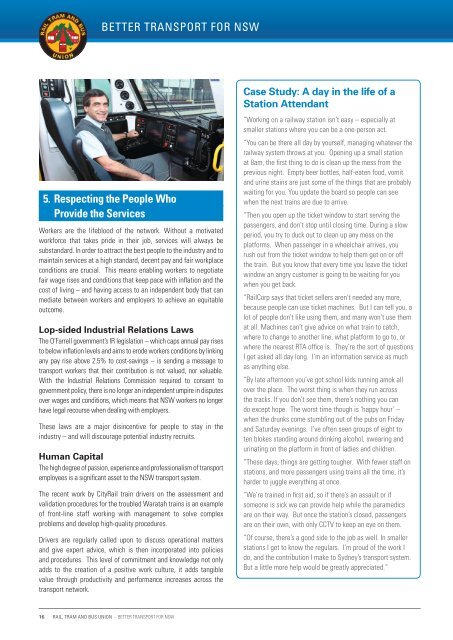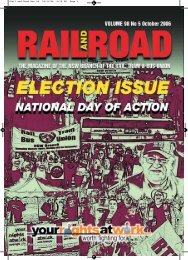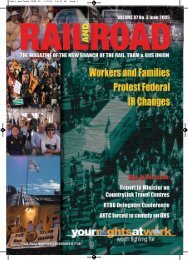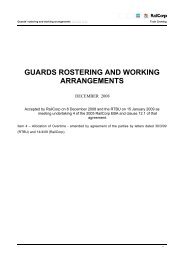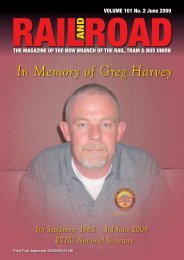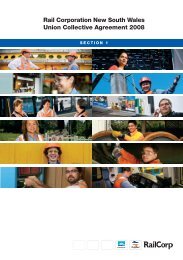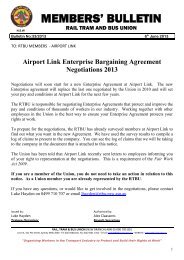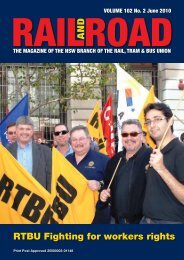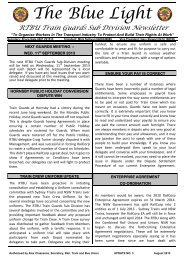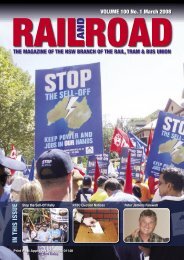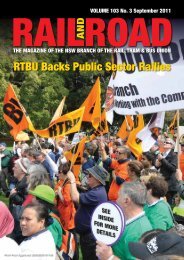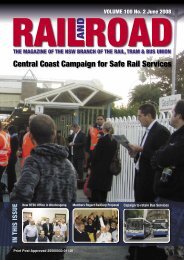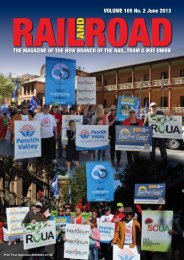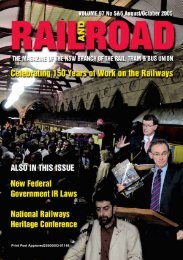Better Transport for NSW - Rail, Tram and Bus Union of NSW
Better Transport for NSW - Rail, Tram and Bus Union of NSW
Better Transport for NSW - Rail, Tram and Bus Union of NSW
You also want an ePaper? Increase the reach of your titles
YUMPU automatically turns print PDFs into web optimized ePapers that Google loves.
BETTER TRANSPORT FOR <strong>NSW</strong><br />
Case Study: A day in the life <strong>of</strong> a<br />
Station Attendant<br />
5. Respecting the People Who<br />
Provide the Services<br />
Workers are the lifeblood <strong>of</strong> the network. Without a motivated<br />
work<strong>for</strong>ce that takes pride in their job, services will always be<br />
subst<strong>and</strong>ard. In order to attract the best people to the industry <strong>and</strong> to<br />
maintain services at a high st<strong>and</strong>ard, decent pay <strong>and</strong> fair workplace<br />
conditions are crucial. This means enabling workers to negotiate<br />
fair wage rises <strong>and</strong> conditions that keep pace with inflation <strong>and</strong> the<br />
cost <strong>of</strong> living – <strong>and</strong> having access to an independent body that can<br />
mediate between workers <strong>and</strong> employers to achieve an equitable<br />
outcome.<br />
Lop-sided Industrial Relations Laws<br />
The O’Farrell government’s IR legislation – which caps annual pay rises<br />
to below inflation levels <strong>and</strong> aims to erode workers conditions by linking<br />
any pay rise above 2.5% to cost-savings – is sending a message to<br />
transport workers that their contribution is not valued, nor valuable.<br />
With the Industrial Relations Commission required to consent to<br />
government policy, there is no longer an independent umpire in disputes<br />
over wages <strong>and</strong> conditions, which means that <strong>NSW</strong> workers no longer<br />
have legal recourse when dealing with employers.<br />
These laws are a major disincentive <strong>for</strong> people to stay in the<br />
industry – <strong>and</strong> will discourage potential industry recruits.<br />
Human Capital<br />
The high degree <strong>of</strong> passion, experience <strong>and</strong> pr<strong>of</strong>essionalism <strong>of</strong> transport<br />
employees is a significant asset to the <strong>NSW</strong> transport system.<br />
The recent work by City<strong>Rail</strong> train drivers on the assessment <strong>and</strong><br />
validation procedures <strong>for</strong> the troubled Waratah trains is an example<br />
<strong>of</strong> front-line staff working with management to solve complex<br />
problems <strong>and</strong> develop high-quality procedures.<br />
Drivers are regularly called upon to discuss operational matters<br />
<strong>and</strong> give expert advice, which is then incorporated into policies<br />
<strong>and</strong> procedures. This level <strong>of</strong> commitment <strong>and</strong> knowledge not only<br />
adds to the creation <strong>of</strong> a positive work culture, it adds tangible<br />
value through productivity <strong>and</strong> per<strong>for</strong>mance increases across the<br />
transport network.<br />
“Working on a railway station isn’t easy – especially at<br />
smaller stations where you can be a one-person act.<br />
“You can be there all day by yourself, managing whatever the<br />
railway system throws at you. Opening up a small station<br />
at 8am, the first thing to do is clean up the mess from the<br />
previous night. Empty beer bottles, half-eaten food, vomit<br />
<strong>and</strong> urine stains are just some <strong>of</strong> the things that are probably<br />
waiting <strong>for</strong> you. You update the board so people can see<br />
when the next trains are due to arrive.<br />
“Then you open up the ticket window to start serving the<br />
passengers, <strong>and</strong> don’t stop until closing time. During a slow<br />
period, you try to duck out to clean up any mess on the<br />
plat<strong>for</strong>ms. When passenger in a wheelchair arrives, you<br />
rush out from the ticket window to help them get on or <strong>of</strong>f<br />
the train. But you know that every time you leave the ticket<br />
window an angry customer is going to be waiting <strong>for</strong> you<br />
when you get back.<br />
“<strong>Rail</strong>Corp says that ticket sellers aren’t needed any more,<br />
because people can use ticket machines. But I can tell you, a<br />
lot <strong>of</strong> people don’t like using them, <strong>and</strong> many won’t use them<br />
at all. Machines can’t give advice on what train to catch,<br />
where to change to another line, what plat<strong>for</strong>m to go to, or<br />
where the nearest RTA <strong>of</strong>fice is. They’re the sort <strong>of</strong> questions<br />
I get asked all day long. I’m an in<strong>for</strong>mation service as much<br />
as anything else.<br />
“By late afternoon you’ve got school kids running amok all<br />
over the place. The worst thing is when they run across<br />
the tracks. If you don’t see them, there’s nothing you can<br />
do except hope. The worst time though is ‘happy hour’ –<br />
when the drunks come stumbling out <strong>of</strong> the pubs on Friday<br />
<strong>and</strong> Saturday evenings. I’ve <strong>of</strong>ten seen groups <strong>of</strong> eight to<br />
ten blokes st<strong>and</strong>ing around drinking alcohol, swearing <strong>and</strong><br />
urinating on the plat<strong>for</strong>m in front <strong>of</strong> ladies <strong>and</strong> children.<br />
“These days, things are getting tougher. With fewer staff on<br />
stations, <strong>and</strong> more passengers using trains all the time, it’s<br />
harder to juggle everything at once.<br />
“We’re trained in first aid, so if there’s an assault or if<br />
someone is sick we can provide help while the paramedics<br />
are on their way. But once the station’s closed, passengers<br />
are on their own, with only CCTV to keep an eye on them.<br />
“Of course, there’s a good side to the job as well. In smaller<br />
stations I get to know the regulars. I’m proud <strong>of</strong> the work I<br />
do, <strong>and</strong> the contribution I make to Sydney’s transport system.<br />
But a little more help would be greatly appreciated.”<br />
16<br />
RAIL, TRAM AND BUS UNION - BETTER TRANSPORT FOR <strong>NSW</strong>


